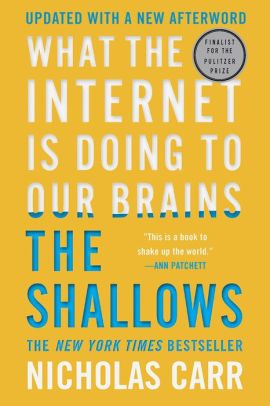Podcast #632: How the Internet Makes Our Minds Shallow
Description
<iframe title="#632: How the Internet Makes Our Minds Shallow" src="https://omny.fm/shows/the-art-of-manliness/632-how-the-internet-makes-our-minds-shallow/embed" width="100%" height="180" frameborder="0"></iframe>
Have you found it harder and harder to sit with a good book for long periods of time without getting that itch to check your phone? Well, you’re not alone. My guest today makes the case that the internet has changed our brains in ways that make deep, focused thinking harder and harder.
His name is Nicholas Carr, and he documented what was then a newly-emerging phenomenon ten years ago in his book The Shallows: What the Internet Is Doing to Our Brains. The Shallows has now been re-released with a new afterword, and Nick and I begin our conversation with how he thinks the effect of digital technology on our minds has or hasn’t changed over the last decade. We then discuss the idea of the medium being the message when it comes to the internet, and how this particular medium changes our brains and the ways we think and approach knowledge and the world. Nick then explains how we read texts on screens differently than texts in books, why hyperlinks mess with our ability for comprehension, why it’s still important to develop our own memory bank of knowledge even in a time when we can access facts from an outsourced digital brain, and how social media amplifies our craving for the fast and easy-to-digest over the slow and contemplative. We end our conversation with how Nick himself has tried to strike a balance in keeping the advantages of the internet while mitigating its downsides.
If reading this in an email, click the title of the post to listen to the show.
Show Highlights
- What has changed in the ten years since Nick’s book was published
- What originally got Nick on this path of researching internet use
- The incredible nature of neuroplasticity
- How intellectual technologies (reading, writing, etc.) have shaped the human mind
- How did pre-literate, oral cultures think?
- The ways reading shapes our culture and thinking
- The scientific evidence about what the internet is doing to our brains
- Why reading on a screen is not the same as reading on a page
- The distracting nature of hyperlinks
- Has the internet helped our memory or thinking in any way?
- The metaphors of the brain and seeing it as a computer
- How Nick has managed his digital life
Resources/People/Articles Mentioned in Podcast
- My first interview with Nicholas about why the idea of utopia is creepy
- The Complete Guide to Breaking Your Smartphone Habit
- I Want You . . . To Put Away Your Smartphone
- What Ancient Philosophers Can Teach You About Using Your Smartphone
- Becoming a Digital Minimalist
- The Case for Being Unproductive
- Marshall McLuhan
- Why the King Complex Makes the Internet So Hard to Put Down
- How to Quit Mindlessly Surfing the Internet and Actually Get Stuff Done
- Escape the Algorithm!
- How Navigation Makes Us Human
- How to Read Nature
- How to Read a Book
- How to Read Long and Difficult Books
Connect With Nicholas
Listen to the Podcast! (And don’t forget to leave us a review!)
Listen to the episode on a separate page.
Subscribe to the podcast in the media player of your choice.
Listen ad-free on Stitcher Premium; get a free month when you use code “manliness” at checkout.
Podcast Sponsors
Click here to see a full list of our podcast sponsors.
Read the Transcript
Brett McKay: Brett McKay here, and welcome to another edition of The Art of Manliness podcast. Have you found it harder and harder to sit with a good book for long periods of time without getting that itch to check your phone? Well, you’re not alone. My guest today makes the case that the internet has changed our brains in ways that make deep, focused thinking harder and harder. His name is Nicholas Carr, and he documented what was then a newly-emerging phenomenon 10 years ago in his book The Shallows: What the Internet is Doing to Our Brains. The Shallows has now been re-released with a new afterword, and Nick and I begin our conversation with how he thinks the effect of digital technology on our minds has or hasn’t changed over the last decade.
We then discuss the idea of the medium being the message when it comes to the internet, and how this particular medium changes our brains and the ways we think and approach knowledge in the world. Nick then explains how we read text on screens differently than text in books, why hyperlinks mess with our ability for comprehension, why it’s still important to develop our own memory bank of knowledge, even in a time when we can access facts from an outsourced digital brain, and how social media amplifies our craving for the fast and easy-to-digest over the slow and contemplative, and we end our conversation with how Nick himself has tried to strike a balance in keeping the advantages of the internet while mitigating its downsides. After the show’s over, check out our show notes at aom.is/shallows.
Alright, Nicholas Carr, welcome back to the show.
Nick Carr: Thank you, Brett, it’s my pleasure to return.
Brett McKay: So we had you on the show a few years ago to talk about your collection of essays, Utopia is Creepy. Got you back on the show because, 10 years ago, you wrote a book called The Shallows: How











